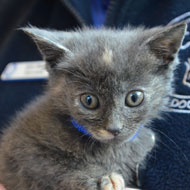
MP names rescue cat after whimsical lodge
A stray kitten has been renamed Whittington by the UK's minister for heritage, Ed Vaizey MP, to celebrate the new listed status of Whittington Lodge, part of Battersea Dogs and Cats Home.
The charming lodge was first used to house 787 of the charity's stray cats at the turn of the 20th century and was named after Dick Whittington.
Mr Vaizey granted the building Grade II Listed status and during his visit to the charity's London site, decided to rename one of Battersea's stray kittens in honour of the occasion.
Whittington is just seven weeks old. She arrived at Battersea with her litter mates in November after their mother was frightened by loud noises from building works and disappeared. The kitten is currently being fostered until she finds a new home.
Battersea's chief executive Claire Horton said the charity is "thrilled" about its new listed status. "Whittington Lodge was very possibly the nation’s first cattery, providing a home for nearly 800 cats in its first year of use.
"We’ve cared for nearly a quarter of a million cats since its construction and Whittington Lodge has stood the test of time, surviving two World Wars.
"Listing accreditation for this wonderful architectural treasure further cements Battersea’s status as one of the intrinsic parts of the London landscape."
Whittington Lodge was originally built in 1907 by the architect Clough William-Ellis, who later created the Italianate masterpiece, Portmeirion in North Wales. Whittington Lodge remains much loved and admired by millions of visitors to the charity each year. It is thought it may even have inspired the architect's work on Portmeirion.
The building is located at the entrance to Battersea's entrance courtyard. The charity is encouraging architecture enthusiasts to visit the home to see it for themselves.
Image courtesy of Battersea Dogs and Cats Home



 The Veterinary Medicines Directorate (VMD) is inviting applications from veterinary students to attend a one-week extramural studies (EMS) placement in July 2026.
The Veterinary Medicines Directorate (VMD) is inviting applications from veterinary students to attend a one-week extramural studies (EMS) placement in July 2026.